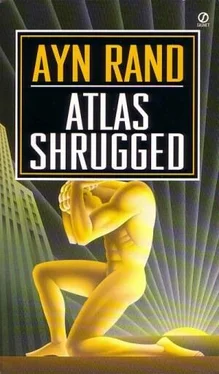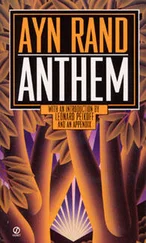She fell down on her knees by the side of the mattress. Galt looked up at her, as he had looked on their first morning in the valley, his smile was like the sound of a laughter that had never been touched by pain, his voice was soft and low: "We never had to take any of it seriously, did we?"
Tears running down her face, but her smile declaring a full, confident, radiant certainty, she answered, "No, we never had to."
Rearden and Danneskjold were cutting his bonds. Francisco held a flask of brandy to Galt's lips. Galt drank, and raised himself to lean on an elbow when his arms were free. "Give me a cigarette," he said.
Francisco produced a package of dollar-sign cigarettes. Galt's hand shook a little, as he held a cigarette to the flame of a lighter, but Francisco's hand shook much more.
Glancing at his eyes over the flame, Galt smiled and said in the tone of an answer to the questions Francisco was not asking, "Yes, it was pretty bad, but bearable—and the kind of voltage they used leaves no damage,”
"I'll find them some day, whoever they were . . ." said Francisco; the tone of his voice, flat, dead and barely audible, said the rest.
"If you do, you'll find that there's nothing left of them to kill."
Galt glanced at the faces around him; he saw the intensity of the relief in their eyes and the violence of the anger in the grimness of their features; he knew in what manner they were now reliving his torture.
"It's over," he said. "Don't make it worse for yourself than it was for me."
Francisco turned his face away. "It's only that it was you . . ." he whispered, "you . . . if it were anyone but you . . ."
"But it had to be me, if they were to try their last, and they've tried, and"—he moved his hand, sweeping the room—and the meaning of those who had made it—into the wastelands of the past—"and that's that."
Francisco nodded, his face still turned away; the violent grip of his fingers clutching Galt's wrist for a moment was his answer.
Galt lifted himself to a sitting posture, slowly regaining control of his muscles. He glanced up at Dagny's face, as her arm shot forward to help him; he saw the struggle of her smile against the tension of her resisted tears; it was the struggle of her knowledge that nothing could matter beside the sight of his naked body and that this body was living —against her knowledge of what it had endured. Holding her glance, he raised his hand and touched the collar of her white sweater with his fingertips, in acknowledgment and in reminder of the only things that were to matter from now on. The faint tremor of her lips, relaxing into a smile, told him that she understood.
Danneskjold found Galt's shirt, slacks and the rest of his clothing, which had been thrown on the floor in a corner of the room. "Do you think you can walk, John?" he asked.
"Sure."
While Francisco and Rearden were helping Galt to dress, Danneskjold proceeded calmly, systematically, with no visible emotion, to demolish the torture machine into splinters.
Galt was not fully steady on his feet, but he could stand, leaning on Francisco's shoulder. The first few steps were hard, but by the time they reached the door, he was able to resume the motions of walking.
His one arm encircled Francisco's shoulders for support; his other arm held Dagny's shoulders, both to gain support and to give it.
They did not speak as they walked down the hill, with the darkness of the trees closing in about them for protection, cutting off the dead glow of the moon and the deader glow in the distance behind them, in the windows of the State Science Institute.
Francisco's airplane was hidden in the brush, on the edge of a meadow beyond the next hill. There were no human habitations for miles around them. There were no eyes to notice or to question the sudden streaks of the airplane's headlights shooting across the desolation of dead weeds, and the violent burst of the motor brought to life by Danneskjold, who took the wheel.
With the sound of the door slamming shut behind them and the forward thrust of the wheels under their feet, Francisco smiled for the first time.
"This is my one and only chance to give you orders," he said, helping Galt to stretch out in a reclining chair. "Now lie still, relax and take it easy . . . You, too," he added, turning to Dagny and pointing at the seat by Galt's side.
The wheels were running faster, as if gaining speed and purpose and lightness, ignoring the impotent obstacles of small jolts from the ruts of the ground. When the motion turned to a long, smooth streak, when they saw the dark shapes of the trees sweeping down and dropping past their windows, Galt leaned silently over and pressed his lips to Dagny's hand: he was leaving the outer world with the one value he had wanted to win from it.
Francisco had produced a first-aid kit and was removing Rearden's shirt to bandage his wound. Galt saw the thin red trickle running from Rearden's shoulder down his chest.
"Thank you, Hank," he said.
Rearden smiled. "I will repeat what you said when I thanked you, on our first meeting: 'If you understand that I acted for my own sake, you know that no gratitude is required.' "
"I will repeat," said Galt, "the answer you gave me: 'That is why I thank you.'"
Dagny noticed that they looked at each other as if their glance were the handshake of a bond too firm to require any statement. Rearden saw her watching them—and the faintest contraction of his eyes was like a smile of sanction, as if his glance were repeating to her the message he had sent her from the valley.
They heard the sudden sound of Danneskjold's voice raised cheerfully in conversation with empty space, and they realized that he was speaking over the plane's radio: "Yes, safe and sound, all of us. . . .
Yes, he's unhurt, just shaken a little, and resting. . . . No, no permanent injury. . . . Yes, we're all here. Hank Rearden got a flesh wound, but"—he glanced over his shoulder—"but he's grinning at me right now. . . . Losses? I think we lost our temper for a few minutes back there, but we're recovering. . . . Don't try to beat me to Galt's Gulch, I'll land first—and I'll help Kay in the restaurant to fix your breakfast."
"Can any outsiders hear him?" asked Dagny.
"No,” said Francisco. "It's a frequency they're not equipped to get."
"Whom is he talking to?" asked Galt.
"To about half the male population of the valley," said Francisco, "or as many as we had space for on every plane available. They are flying behind us right now. Did you think any of them would stay home and leave you in the hands of the looters? We were prepared to get you by open, armed assault on that Institute or on the Wayne-Falkland, if necessary. But we knew that in such case we would run the risk of their killing you when they saw that they were beaten. That's why we decided that the four of us would first try it alone. Had we failed, the others would have proceeded with an open attack. They were waiting, half a mile away. We had men posted among the trees on the hill, who saw us get out and relayed the word to the others. Ellis Wyatt was in charge. Incidentally, He's flying your plane. The reason we couldn't get to New Hampshire as fast as Dr. Ferris, is that we had to get our planes from distant, hidden landing places, while he had the advantage of open airports. Which, incidentally, he won't have much longer."
"No," said Galt, "not much longer."
"That was our only obstacle. The rest was easy. I'll tell you the whole story later. Anyway, the four of us were all that was necessary to beat their garrison."
"One of these centuries," said Danneskjold, turning to them for a moment, "the brutes, private or public, who believe that they can rule their betters by force, will learn the lesson of what happens when brute force encounters mind and force."
Читать дальше










